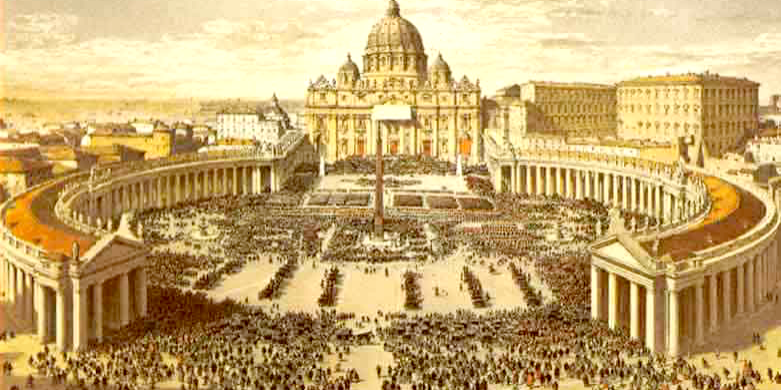
Outside the Church there is No Salvation…Sort of
By Chris Castaldo –
The doctrine that “Outside the Church there is no salvation” (Extra Ecclesiam Nulla Salus), first expressed by the third century martyr/bishop, Cyprian, and to this day by the Roman Catholic Magisterium, is a matter of much confusion. At face value (when expressed by Rome) it points to the Catholic Church institution as the single location where humanity encounters divine grace. But it’s not that simple. In what follows, we will briefly consider how the exclusivity of Cyprian’s dictum relates to the inclusive emphasis of today’s Catholic Church.
The Vatican II document Lumen Gentium, promulgated by Pope Paul VI in 1964, is a helpful place to start:
Those also can attain to salvation who through no fault of their own do not know the Gospel of Christ or His Church, yet sincerely seek God and moved by grace strive by their deeds to do His will as it is known to them through the dictates of conscience. Nor does Divine Providence deny the helps necessary for salvation to those who, without blame on their part, have not yet arrived at an explicit knowledge of God and with His grace strive to live a good life. (Lumen Gentium, 2.16; cf. Gaudium et Spes 1.22)
The necessary foundation of implicit knowledge is “invincible ignorance”—the state in which one is without access to Christian revelation. This is, for example, the pigmy, aborigine, or post Christian European who has never heard the gospel. Since such people have not received an opportunity to understand and respond to the explicit teaching of Christ, they are “inculpable.” Assuming this ignorance is genuinely outside of their control (that it is not due to prejudice or neglect) and that there is perfect contrition and a desire to do God’s will, then, moved by divine grace, these persons may pursue and lay hold of salvation through their conscience.
Perhaps the biggest exponent of this concept was the twentieth century theologian, Karl Rahner:
The “anonymous Christian” in our sense of the term is the pagan after the beginning of the Christian mission, who lives in a state of Christ’s grace through faith, hope, and love, yet who has no explicit knowledge of the fact that his life is orientated in grace-given salvation to Jesus Christ… There must be a Christian theory to account for the fact that every individual who does not in any absolute or ultimate sense act against his own conscience can say and does say in faith, hope and love, Abba within his own spirit and is on these grounds in all truth a brother to Christians in God’s sight. (Theological Investigations, Vol. 14, Chp. 17.)
This view seeks to reconcile God’s universal will, as expressed in passages such as 1 Tim 2:4 (that “God desires all people to be saved”) with the necessity of faith in Christ (Extra Ecclesiam Nulla Salus). It implies that all people have some opportunity to believe, precisely because God is at work in all people. Where is the locus of this work? It is through general revelation, which includes other religions and one’s moral sensibilities. It may even apply to the atheist insofar as such a person is motivated by grace with sincere contrition. How the atheist is said to believe in God introduces the category of anonymity. Thus, because it is God who manifests himself through one’s conscience, a person can genuinely believe, even though he or she perceives the object of belief to be something other than God. Accordingly, one’s encounter with transcendent reality (anonymous as it may be) is regarded as a divine experience.
The theory of anonymous Christianity has fit like hand-in-glove in today’s relativistic culture where the subjective reputation of truth is the plat du jour. In this epistemological universe, doctrine is regarded as the product of one’s own creation. Perhaps it is for this reason that sociologists of religion at Catholic University recently reported that 88% of American Catholics say “how a person lives is more important than whether he or she is Catholic.” In addition to demonstrating the practical significance of theology, it offers new meaning to Cyprian’s nulla salus.
Chris Castaldo serves as director of the Ministry of Gospel Renewal for the Billy Graham Center at Wheaton College. He is the author of Holy Ground: Walking with Jesus as a Former Catholic and a main contributor to Journeys of Faith: Evangelicalism, Eastern Orthodoxy, Catholicism, Anglicanism (January 2012). He blogs at www.chriscastaldo.com.
This column comes from the January issue of Credo Magazine, “In Christ Alone.” Read other columns and articles like this one today!
The January issue argues for the exclusivity of the gospel, especially in light of the movement known as inclusivism. This issue will seek to answer questions like: Can those who have never heard the gospel of Christ be saved? Will everyone be saved in the end or will some spend an eternity in hell? Must someone have explicit faith in Christ to be saved? Contributors include David Wells, Robert Peterson, Michael Horton, Gerald Bray, Todd Miles, Todd Borger, Ardel Caneday, Nathan Finn, Trevin Wax, Michael Reeves, and many others.
To view the magazine as a PDF Click Here

